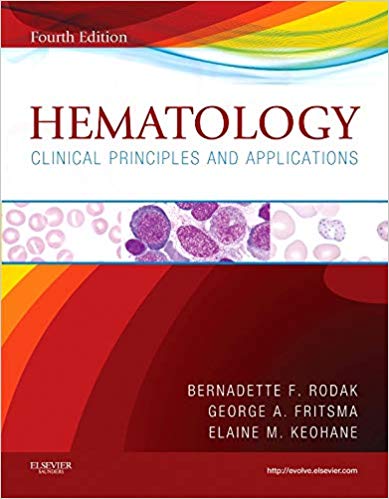
Featuring hundreds of full-color photomicrographs, Hematology: Clinical Principles and Applications prepares you for a job in the clinical lab by exploring the essential aspects of hematology. It shows how to accurately identify cells, simplifies hemostasis and thrombosis concepts, and covers normal hematopoiesis through diseases of erythroid, myeloid, lymphoid, and megakaryocytic origins. This book also makes it easy to understand complementary testing areas such as flow cytometry, cytogenetics, and molecular diagnostics. Well-known authors Bernadette Rodak, George Fritsma, and Elaine Keohane cover everything from working in a hematology lab to the parts and functions of the cell to laboratory testing of blood cells and body fluid cells.
- Full-color illustrations make it easier to visualize complex concepts and show what you’ll encounter in the lab.
- Learning objectives begin each chapter, and review questions appear at the end.
- Instructions for lab procedures include sources of possible errors along with comments.
- Case studies provide opportunities to apply hematology concepts to real-life scenarios.
- Hematology instruments are described, compared, and contrasted.
- Coverage of hemostasis and thrombosis includes the development and function of platelets, the newest theories of normal coagulation, and clear discussions of platelet abnormalities and disorders of coagulation.
- A bulleted summary of important content appears at the end of every chapter.
- A glossary of key terms makes it easy to find and learn definitions.
- Hematology/hemostasis reference ranges are listed on the inside front and back covers for quick reference.
- Respected editors Bernadette Rodak, George Fritsma, and Elaine Keohane are well known in the hematology/clinical laboratory science world.
- Student resources on the companion Evolve website include the glossary, weblinks, and content updates.
- New content is added on basic cell biology and etiology of leukocyte neoplasias.
- Updated Molecular Diagnostics chapter keeps you current on techniques being used in the lab.
- Simplified hemostasis material ensures that you can understand this complex and important subject.
- Coverage of morphologic alteration of monocytes/macrophages is condensed into a table, as the disorders in this grouping are more of a biochemical nature with minimal hematologic evidence.

